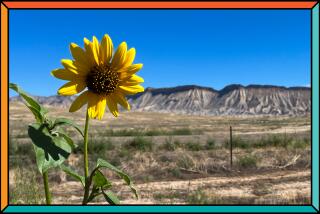North of the Border for the Small-Town News
My retired colleague Cecil Smith, once radio and TV editor of The Times, expatriated himself some years ago, with his wife Cleo, to San Miguel Allende, Mexico, where they enjoy the slower pace and the relatively lower cost of living.
Recently they crossed the border to visit in Baton Rouge, La., where, Cecil said, he found a column of mine in the Baton Rouge Standard.
“One of the great pleasures for me in returning from Mexico to the Old Country,” he writes, “is devouring American newspapers. We have a pretty good national English-language paper here (in San Miguel Allende), the Mexico City News, which provides Doonesbury, Anthony Scott, Ann Landers and occasionally Conrad; but it is so occupied (reasonably enough) with Latin American news, mostly bad, that you lose sight of what is happening north of the Rio Grande, like how are the Dodgers doing.”
I share Cecil’s passion for small-town newspapers on my travels. They remind us that there is a world other than the one we live in. And they do an admirable job of covering their own communities. Recently I have been much entertained and informed by the local newspapers at Lake Tahoe, Aspen, Colo., and Brawley, on our visits in those towns.
Usually, however, there is little violence or even conflict in them. We may read of a fight in their city councils over a zoning ordinance, or alarm over the depredations of tourists; but the bulk of the news is about who visited whom, who got married, who had a baby, what clubs met, and who died. The police news most often concerns a lost child, a treed cat, a petty theft, or a trespasser.
Once he crosses the border, Cecil says, he starts feeding quarters in vending machines to get the local newspapers. “I never buy national newspapers like USA Today or the Wall Street Journal. I dote on local news. What councilman, for instance, in Alice, Tex., is accused of siphoning off part of the fertilizer money earmarked for the new park? No, what I look for is not the earthshaking summits of world leaders but the human comedy that the American press still records (television doesn’t understand it.)”
Besides Baton Rouge, the Smiths visited Biloxi and Mobile, and several towns in Florida--Marianne, Atlantic Beach, Sarasota, Casey Key and the tourist traps that surround Disney World.
“All have papers. But the thing that got me about these various publications was how defiantly local they were. Gorbachev might get a mention on the front page and there may be a story somewhere about Bush, but generally their columns were crowded with local doings.”
What shocked Cecil was the nature of those doings. “Crimes of passion, lust and rape, bitter divorces, some complete with sordid details, murders of various kinds, garrotings, stabbings, drownings, poisonings and gunfire; no page was printed without half a dozen incidents of shootings.
“The South is one great smoldering mass of violent action and stormy passions. I think it’s the heat. Or the humidity. But it was apparent where Faulkner and Carson McCullers and all those female Southern novelists got their steamy material--right out of the daily press. I must say your entry was a breath of air in a fetid chamber.”
I have never been in the South, except for an emergency landing in a DC-3 one night at Mobile and a weekend aboard an aircraft carrier off Pensacola. I have read some Faulkner and McCullers and seen the plays of Tennessee Williams, but I had supposed that they were writing about special cases, and not reflecting the entire culture.
I wonder that the thousands of Angelenos who are leaving Los Angeles for less crowded places don’t consider the South. Most of them seem to be resettling in the northwestern or southwestern states--Washington, Oregon, Idaho, Arizona, New Mexico; some have even gone to North Dakota, despite the subzero winter temperatures.
But the South seems to offer the best of both worlds. One can live in smaller cities there without sacrificing the kind of sordid news one has become used to from living in Los Angeles.
I imagine that many Southerners will come forward to condemn Cecil Smith’s vision of the South. So far, I can only plead ignorance. Maybe this fall my wife and I will drive through the Southern states and find out firsthand.
If so, I’ll get back to you, assuming we aren’t shot dead in the street.
More to Read
Sign up for Essential California
The most important California stories and recommendations in your inbox every morning.
You may occasionally receive promotional content from the Los Angeles Times.










